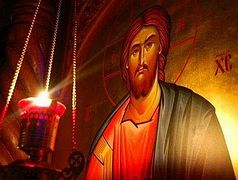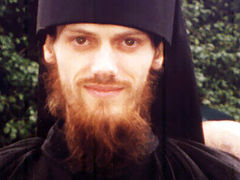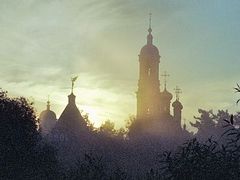It happened at the height of perestroika. At that time I worked as a staff reporter in a regional newspaper, though I lived in my town and seldom travelled to the editorial office. One day I came to attend the funeral of the head of a group of correspondents who had earlier accepted me for employment.
The oldest and most experienced journalist of the newspaper of the Communist Party’s regional committee, one of the main and most indispensable workers, who carried the whole newspaper on his broad shoulders, he was devoted to his job to the point of fanaticism. He would arrive at the office at five in the morning and leave last—often after the midnight, sometimes sleeping right in his office room. A loyal and convinced Communist, an extremely honest person and man of principles, he became a living legend among his colleagues. Whenever he was away on business, he would dine at a local canteen at his own expense and sleep on the table of the collective farm’s management office so that nobody might ever imagine that a Soviet journalist owed anything to anyone, and, therefore, was “biased.”
The farewell ceremony took place according to the Party protocol—in an assembly hall, with a red flag by the coffin, with awards on cushions, speeches of Party figures and his fellow-journalists. Since the reposed head of a group of correspondents was an atheist to the core and wouldn’t even hear of the Church, the faith and religion as “the opium of the people”, the funeral was without a priest, with no funeral service, no incense or candles.
A coach drove us to and from the cemetery. The funeral meal was arranged in the editorial canteen. The editor-in-chief and colleagues among the journalists took turns standing up and saying many good things about the newly reposed senior fellow-worker and wished him “to rest in peace.” I remember the deputy editor-in-chief saying:
“We don’t know whether ‘the other world’ exists because no one has ever returned from it and told us anything about it. But if it does exist, may our friend be happy there.”
Valentina, a journalist of the culture department who was sitting on my right, each time would raise a glass of soda (and not vodka) like me. She was sitting quietly, just nodding her agreement after each toast; but after the deputy editor’s speech she uttered in a low voice to herself without addressing anybody:
“Why do you say no one has returned? Some have!”
***
I had a lot of time before the coach, so I went to the office of my mentor—the head of the correspondence department—to while away the time. Valentina, her best friend, looked in on her too. We spent some time together over tea and chatted.
Valentina was a representative of a generation of journalists younger than that of the boss we had just “seen off”, and was religious. She was almost the same age as my parents; and I always had a profound respect for her not only because of the age gap—there are people for whom you begin to feel affection at first sight. You see by the face and the eyes that a good, decent, honest and sincere person is in front of you. I liked all that Valentina wrote very much—feature stories, articles and sketches.
But we had known each other only nominally and apart from matters of work, our paths had not crossed before. But now we talked a little. I asked her:
“Valya [a diminutive form of the name Valentina.—Trans.], I am sorry: at the table I heard your words that some people return from the other world. Were you just speculating or do you know someone who was there and then returned?”
“I know. I was there and returned. This is how it happened…
***
“I am an Ingrian Finn by nationality. It can be said that Ingrian Finns are Russian Finns. My parents were exiled, and I was born on the Kola Peninsula. We lived in barracks; once I got a severe chest cold, later I had chronic problems with my lungs, and in recent years I have often been very sick. The doctor explained to me that medicine can no longer penetrate into my left lung and it should be removed. And it should be done as soon as possible, otherwise I might die. There was no getting around it. So I went to the hospital for a thorough check-up and prepared for he operation.
“I was operated on under general anesthesia. And at some point I experienced clinical death. Of course, I felt and understood nothing; I was unconscious and didn’t know what happened before and after that. But I do remember that moment! My body was lying on the surgical table, the doctor and his assistants were trying to resuscitate me, while I was ‘hanging’ above them, seeing and hearing everything. Next I ‘flew’ through some walls and found myself in a corridor where my mother and daughter were sitting on a seat. I could hear their conversation, and I still remember what they were talking about.
“I am sure you read the book by Raymond Moody, Life After Life? All that he related there is true. I personally experienced all of that. I ‘flew’ through a tunnel and saw light. A voice told me: ‘You have drained the cup of woe to the dregs. You can stay here or return if you want.’ I felt so good there; I felt such bliss, peace and joy that I cried: ‘Yes! I want to stay! I want to stay!’
“And the next thing I remember is being in my body, lying on the hospital bed and feeling awful pain in my dislocated ribs. As it turned out, a long time had passed since the operation. For about three days I thought only the following: ‘Well, when in the world are they going to take me?’ When I realized that it was certainly not that time, it hurt me to the point of tears: ‘How can it be? I was asked and I answered that I want to stay! Why am I still here? Why did they not listen to me?’
“Soon I was on the way to recovery and transferred from the ICU to a normal ward. At last my dear mom and daughter came to visit me. And I thought: ‘Maybe I haven’t finished my mission on the earth yet; I am probably needed by my family and friends…’
“And not only does ‘the other world’ exist: it is more real than our world, to such an extent that it seemed for a long time that our life is very ‘unreal’, like a hologram. As if from a voluminous and colorful world I had gone into a flat, colorless one, which has almost no sounds and no smells. Now I have already gotten used to it.
“My worldview hasn’t changed since then, but I am no longer afraid of death after that occurrence because I know that there is no death.”
***
Many years have passed since that conversation. Soon I changed my place of work and didn’t meet Valentina again. But through mutual acquaintances we would always send regards to each other. She is still alive. Who knows, maybe we will meet again.





